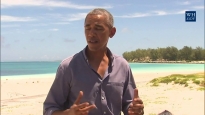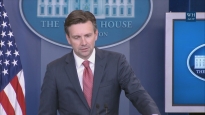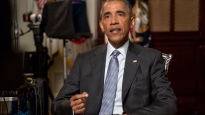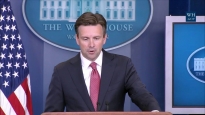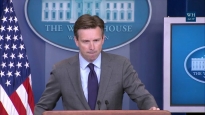President Obama Speaks to the People of Northern Ireland
June 17, 2013 | 36:15 | Public Domain
Following an introduction by First Lady Michelle Obama, President Obama delivers remarks to the people of Northern Ireland, highlighting the hard work, dialogue, and institutional development they have undertaken together to advance peace and prosperity.
Remarks by President Obama and Mrs. Obama in Town Hall with Youth of Northern Ireland
Belfast Waterfront
Belfast, Northern Ireland
9:58 A.M. BST
MRS. OBAMA: Good morning. (Applause.) Oh, what an honor. Good morning, everyone. First of all, let me thank Hannah for that very bold and wonderful introduction. And of course, I want to thank all of you for being here today.
It is such a pleasure to be here in Belfast. And as you might imagine, whenever we travel to places like this or anywhere else in the world, we’ve got a pretty packed schedule. We’re meeting with Presidents and Prime Ministers and First Ladies. We’re visiting historical sites and attending state dinners. And my husband is spending hours trying to make progress on global issues from trade to international security.
But wherever we go, no matter what’s on our plate, we always do our best to meet with young people just like all of you. In fact, you all might just very well be some of the most important people that we talk to during our visits, because in just a couple of decades, you will be the ones in charge. Yes, indeed. You’ll be the ones shaping our shared future with your passion and energy and ideas.
So when I look around this room, I don’t just see a bunch of teenagers. I see the people who will be moving our world forward in the years ahead. And that’s why we wanted to be here today.
Let me tell you, when I was your age, I never dreamed that I’d be standing here as First Lady of the United States. And I know that my husband never thought he’d be President, either. Neither of us grew up with much money. Neither of my parents went to university. Barack’s father left his family when Barack was just two years old. He was raised by a single mom.
And all along the way, there were plenty of people who doubted that kids like us had what it took to succeed -- people who told us not to hope for too much or set our sights too high.
But Barack and I refused to let other people define us. Instead, we held tight to those values we were raised with -- things like honesty, hard work, a commitment to our education.
We did our best to be open to others; to give everyone we met a fair shake, no matter who they were or where they came from. And we soon realized that the more we lived by those values, the more we’d see them from other people in return. We saw that when we reached out and listened to somebody else’s perspective, that person was more likely to listen to us. If we treated a classmate with respect, they’d treat us well in return.
And that’s sort of how we became who we are today. That’s how we learned what leadership really means. It’s about stepping outside of your comfort zone to explore new ideas. It's about rising above old divisions. It's about treating people the way you want to be treated in return.
And as young people, you all are in a very powerful position to make some of those same choices yourselves. You have the freedom of an open mind. You have a fresh perspective that can help you find solutions to age-old problems. And with today’s technology, you can connect with other young people from all over Northern Ireland and all around the world.
So right now, you’ve got a choice to make. You’ve got to decide how you’re going to use those advantages and opportunities to build the lives you dream of. Because that decision will determine not only the kinds of people you’ll become, but also the kinds of communities you’ll live in, the kind of world we’ll all share together.
And standing here with all of you today, I have never felt more optimistic, let me tell you. Because time and again, I have seen young people like all of you choosing to work together, choosing to lift each other up, choosing to leave behind the conflicts and prejudices of the past and create a bright future for us all.
That’s what’s so powerful about your generation. And again, that’s why we’re here today -- because we want you to know that we believe in each and every one of you. That is exactly why we're here. We believe that you all have the ability to make a mark on this world that will last for generations to come. We are so proud of you. We expect great things.
So with that, I think it would be a good opportunity for me to introduce someone who accompanied me here today. (Laughter.) I let him travel with me every now and then. (Laughter.) But he is someone who is just as excited and delighted to deliver a message of encouragement and support to all of you -- my husband, the President of the United States, Barack Obama. (Applause.)
PRESIDENT OBAMA: Thank you! Thank you so much. (Applause.) Thank you very much. Please be seated.
Well, hello, Belfast! (Applause.) Hello, Northern Ireland! (Applause.) You now know why it’s so difficult to speak after Michelle -- she’s better than me. (Laughter.) But on behalf of both of us, thank you so much for this extraordinarily warm welcome.
And I want to thank Hannah for introducing my wife. We had a chance to speak with Hannah backstage and she’s an extraordinary young woman, who I know is going to do even greater things in years to come.
I want to thank two men, who I’ve hosted at the White House on many a St. Patrick’s Day, for their warm welcome -- First Minister Peter Robinson -- (applause) -- and Deputy First Minister Martin McGuinness. (Applause.) I spend the whole year trying to unite Washington around things, and they come to visit on St. Patrick’s Day and they do it in a single afternoon. (Laughter.)
I want to thank the Secretary of State for Northern Ireland, Teresa Villiers. (Applause.) To all the Ministers in the audience; to Lord Mayor Máirtín Ó Muilleoir. (Applause.) And I want to thank all the citizens of Belfast and Northern Ireland for your hospitality. (Applause.)
As our daughters pointed out as we were driving in, I cause a big fuss wherever I go. (Laughter.) So traffic and barricades and police officers, and it’s all a big production, a lot of people are involved -- and I’m very, very grateful for accommodating us.
The first time Michelle and I visited this island was about two years ago. We were honored to join tens of thousands on College Green in Dublin. We traveled to the little village of Moneygall, where, as it turned out, my great-great-great grandfather was born. And I actually identified this individual in this place only a few years ago. When I was first running for office in Chicago, I didn’t know this, but I wish I had. (Laughter.) When I was in Chicago, as I was campaigning, they’d look at my last name and they’d say, “Oh, there’s an O’Bama from the homeland running on the South Side, so he must be Irish -- (laughter) -- but I've never heard the Gaelic name, Barack” (Laughter.) But it pays to be Irish in Chicago. (Laughter.)
So while we were in Moneygall, I had a chance to meet my eighth cousin, Henry -- who’s also known as Henry the Eighth. (Laughter.) We knew he was my cousin because his ears flapped out just like mine. (Laughter.) I leafed through the parish logs where the names of my ancestors are recorded. I even watched Michelle learn how to pull a proper pint of “black.”
AUDIENCE MEMBER: Whoop! (Laughter.)
PRESIDENT OBAMA: Who’s cheering for that? (Laughter.)
So it was a magical visit. But the only problem was it was far too short. A volcano in Iceland forced us to leave before we could even spend the night. So we’ve been eager for a chance to return to the Emerald Isle ever since -- and this time, we brought our daughters, too.
In particular, we wanted to come here, to Northern Ireland, a place of remarkable beauty and extraordinary history; part of an island with which tens of millions of Americans share an eternal relationship. America’s story, in part, began right outside the doors of this gleaming hall. Three hundred and twenty-five years ago, a ship set sail from the River Lagan for the Chesapeake Bay, filled with men and women who dreamed of building a new life in a new land.
They, followed by hundreds of thousands more, helped America write those early chapters. They helped us win our independence. They helped us draft our Constitution. Soon after, America returned to Belfast, opening one of our very first consulates here in 1796, when George Washington was still President.
Today, names familiar to many of you are etched on schools and courthouses and solemn memorials of war across the United States -- names like Wilson and Kelly, Campbell and O’Neill. So many of the qualities that we Americans hold dear we imported from this land -- perseverance, faith, an unbending belief that we make our own destiny, and an unshakable dream that if we work hard and we live responsibly, something better lies just around the bend.
So our histories are bound by blood and belief, by culture and by commerce. And our futures are equally, inextricably linked. And that’s why I’ve come to Belfast today -- to talk about the future we can build together.
Your generation, a young generation, has come of age in a world with fewer walls. You’ve been educated in an era of instant information. You’ve been tempered by some very difficult times around the globe. And as I travel, what I’ve seen of young people like you -- around the world, they show me these currents have conspired to make you a generation possessed by both a clear-eyed realism, but also an optimistic idealism; a generation keenly aware of the world as it is, but eager to forge the world as it should be. And when it comes to the future we share, that fills me with hope. Young people fill me with hope.
Here, in Northern Ireland, this generation has known even more rapid change than many young people have seen around the world. And while you have unique challenges of your own, you also have unique reasons to be hopeful. For you are the first generation in this land to inherit more than just the hardened attitudes and the bitter prejudices of the past. You’re an inheritor of a just and hard-earned peace. You now live in a thoroughly modern Northern Ireland.
Of course, the recessions that spread through nearly every country in recent years have inflicted hardship here, too, and there are communities that still endure real pain. But, day to day, life is changing throughout the North. There was a time people couldn’t have imagined Northern Ireland hosting a gathering of world leaders, as you are today. And I want to thank Chief Constable Matt Baggott for working to keep everyone safe this week. (Applause.)
Northern Ireland is hosting the World Police and Fire Games later this year -- (applause) -- which Dame Mary Peters is helping to organize. (Applause.) Golf fans like me had to wait a long six decades for the Irish Open to return to the North last year. (Applause.) I am unhappy that I will not get a few rounds in while I'm here. (Laughter.) I did meet Rory McIlroy last year -- (applause) -- and Rory offered to get my swing “sorted," -- (laughter) -- which was a polite way of saying, “Mr. President, you need help.” (Laughter.)
None of that would have been imaginable a generation ago. And Belfast is a different city. Once-abandoned factories are rebuilt. Former industrial sites are reborn. Visitors come from all over to see an exhibit at the MAC, a play at the Lyric, a concert here at Waterfront Hall. Families crowd into pubs in the Cathedral Quarter to hear “trad.” Students lounge at cafés, asking each other, “What’s the craic?” (Laughter and applause.) So to paraphrase Seamus Heaney, it’s the manifestation of sheer, bloody genius. This island is now chic.
And these daily moments of life in a bustling city and a changing country, it may seem ordinary to many of you -- and that’s what makes it so extraordinary. That’s what your parents and grandparents dreamt for all of you -- to travel without the burden of checkpoints, or roadblocks, or seeing soldiers on patrol. To enjoy a sunny day free from the ever-present awareness that violence could blacken it at any moment. To befriend or fall in love with whomever you want. They hoped for a day when the world would think something different when they heard the word “Belfast.” Because of their effort, because of their courage that day has come. Because of their work, those dreams they had for you became the most incredible thing of all -- they became a reality.
It's been 15 years now since the Good Friday Agreement; since clenched fists gave way to outstretched hands. The people of this island voted in overwhelming numbers to see beyond the scars of violence and mistrust, and to choose to wage peace. Over the years, other breakthroughs and agreements have followed. That’s extraordinary, because for years, few conflicts in the world seemed more intractable than the one here in Northern Ireland. And when peace was achieved here, it gave the entire world hope.
The world rejoiced in your achievement -- especially in America. Pubs from Chicago to Boston were scenes of revelry, folks celebrating the hard work of Hume and Trimble and Adams and Paisley, and so many others. In America, you helped us transcend our differences -- because if there’s one thing on which Democrats and Republicans in America wholeheartedly agree, it’s that we strongly support a peaceful and prosperous Northern Ireland.
But as all of you know all too well, for all the strides that you’ve made, there’s still much work to do. There are still people who haven’t reaped the rewards of peace. There are those who aren’t convinced that the effort is worth it. There are still wounds that haven’t healed, and communities where tensions and mistrust hangs in the air. There are walls that still stand; there are still many miles to go.
From the start, no one was naïve enough to believe that peace would be anything but a long journey. Yeats once wrote “Peace comes dropping slow.” But that doesn’t mean our efforts to forge a real and lasting peace should come dropping slow. This work is as urgent now as it has ever been, because there’s more to lose now than there has ever been.
In today’s hyper-connected world, what happens here has an impact on lives far from these green shores. If you continue your courageous path toward a permanent peace, and all the social and economic benefits that have come with it, that won’t just be good for you, it will be good for this entire island. It will be good for the United Kingdom. It will be good for Europe. It will be good for the world.
We need you to get this right. And what’s more, you set an example for those who seek a peace of their own. Because beyond these shores, right now, in scattered corners of the world, there are people living in the grip of conflict -- ethnic conflict, religious conflict, tribal conflicts -- and they know something better is out there. And they’re groping to find a way to discover how to move beyond the heavy hand of history, to put aside the violence. They’re studying what you’re doing. And they’re wondering, perhaps if Northern Ireland can achieve peace, we can, too. You’re their blueprint to follow. You’re their proof of what is possible -- because hope is contagious. They’re watching to see what you do next.
Now, some of that is up to your leaders. As someone who knows firsthand how politics can encourage division and discourage cooperation, I admire the Northern Ireland Executive and the Northern Ireland Assembly all the more for making power-sharing work. That’s not easy to do. It requires compromise, and it requires absorbing some pain from your own side. I applaud them for taking responsibility for law enforcement and for justice, and I commend their effort to “Building a United Community” -- important next steps along your transformational journey.
Because issues like segregated schools and housing, lack of jobs and opportunity -- symbols of history that are a source of pride for some and pain for others -- these are not tangential to peace; they’re essential to it. If towns remain divided -- if Catholics have their schools and buildings, and Protestants have theirs -- if we can’t see ourselves in one another, if fear or resentment are allowed to harden, that encourages division. It discourages cooperation.
Ultimately, peace is just not about politics. It’s about attitudes; about a sense of empathy; about breaking down the divisions that we create for ourselves in our own minds and our own hearts that don’t exist in any objective reality, but that we carry with us generation after generation.
And I know, because America, we, too, have had to work hard over the decades, slowly, gradually, sometimes painfully, in fits and starts, to keep perfecting our union. A hundred and fifty years ago, we were torn open by a terrible conflict. Our Civil War was far shorter than The Troubles, but it killed hundreds of thousands of our people. And, of course, the legacy of slavery endured for generations.
Even a century after we achieved our own peace, we were not fully united. When I was a boy, many cities still had separate drinking fountains and lunch counters and washrooms for blacks and whites. My own parents’ marriage would have been illegal in certain states. And someone who looked like me often had a hard time casting a ballot, much less being on a ballot.
But over time, laws changed, and hearts and minds changed, sometimes driven by courageous lawmakers, but more often driven by committed citizens. Politicians oftentimes follow rather than lead. And so, especially young people helped to push and to prod and to protest, and to make common cause with those who did not look like them. And that transformed America -- so that Malia and Sasha’s generation, they have different attitudes about differences and race than mine and certainly different from the generation before that. And each successive generation creates a new space for peace and tolerance and justice and fairness.
And while we have work to do in many ways, we have surely become more tolerant and more just, more accepting, more willing to see our diversity in America not as something to fear, but as something to welcome because it's a source of our national strength.
So as your leaders step forward to address your challenges through talks by all parties, they’ll need you young people to keep pushing them, to create a space for them, to change attitudes. Because ultimately, whether your communities deal with the past and face the future united together isn’t something you have to wait for somebody else to do –- that’s a choice you have to make right now.
It's within your power to bring about change. Whether you are a good neighbor to someone from the other side of past battles -- that’s up to you. Whether you treat them with the dignity and respect they deserve -- that’s up to you. Whether you let your kids play with kids who attend a different church -– that’s your decision. Whether you take a stand against violence and hatred, and tell extremists on both sides that no matter how many times they attack the peace, they will not succeed –- that is in your hands. And whether you reach your own outstretched hand across dividing lines, across peace walls, to build trust in a spirit of respect –- that’s up to you. The terms of peace may be negotiated by political leaders, but the fate of peace is up to each of us.
This peace in Northern Ireland has been tested over the past 15 years. It's been tested over the past year. It will be tested again. But remember something that President Clinton said when he spoke here in Belfast just a few weeks after the horrors of Omagh. That bomb, he said, “was not the last bomb of The Troubles; it was the opening shot of a vicious attack on the peace.” And whenever your peace is attacked, you will have to choose whether to respond with the same bravery that you’ve summoned so far, or whether you succumb to the worst instincts. those impulses that kept this great land divided for too long. You'll have to choose whether to keep going forward, not backwards.
And you should know that so long as you are moving forward, America will always stand by you as you do. We will keep working closely with leaders in Stormont, Dublin and Westminster to support your political progress. We’ll keep working to strengthen our economies, including through efforts like the broad economic initiative announced on Friday to unlock new opportunities for growth and investment between our two countries’ businesses –- because jobs and opportunity are essential to peace.
Our scientists will keep collaborating with yours in fields like nanotechnology and clean energy and health care that make our lives better and fuel economic growth on both sides of the Atlantic –- because progress is essential to peace. And because knowledge and understanding is essential to peace, we will keep investing in programs that enrich both of us -– programs like the one at Belfast Metropolitan College, which teaches students from West and North Belfast the skills they need for new jobs, and exchange programs that have given thousands in Northern Ireland and the United States the chance to travel to each other’s communities and learn from one another.
Now, one of those young people is here today. Sylvia Gordon is the director of an organization called Groundwork Northern Ireland, which aims to bring about change from the ground up. (Applause.) Where’s Sylvia? Where’s Sylvia? Is Sylvia here somewhere? Where is she? She’s here somewhere. You’re here, too, yes. Some guy just waved, he said, “I’m here.” (Laughter.) Which is good, I appreciate you being here. (Laughter.)
As someone who got my start as a community organizer, I was so impressed with what Sylvia has done, because a few years ago, Sylvia visited the United States to learn more about how Americans organize to improve their communities. So after she came home, Sylvia rolled up her sleeves here in Belfast and decided to do something about Alexandra Park. Some of you may know this park. For years, it was thought to be the only park in Europe still divided by a wall. Think about that. In all of Europe, that one park has got a wall in the middle of it.
Sylvia and her colleagues knew how hard it would be to do anything about a peace wall, but they reached out to the police, they reached out to the Department of Justice. They brought together people from across the communities. They knew it was going to be hard, but they tried anyway. And together, they all decided to build a gate to open that wall. And now, people can walk freely through the park and enjoy the sun -- when it comes out –- (laughter) -- just like people do every day in parks all around the world.
A small bit of progress. But the fact that so far we’ve only got a gate open and the wall is still up means there’s more work to do. And that’s the work of your generation. As long as more walls still stand, we will need more people like Sylvia. We’ll need more of you, young people, who imagine the world as it should be; who knock down walls; who knock down barriers; who imagine something different and have the courage to make it happen. The courage to bring communities together, to make even the small impossibilities a shining example of what is possible. And that, more than anything, will shape what Northern Ireland looks like 15 years from now and beyond.
All of you -- every single young person here today -- possess something the generation before yours did not, and that is an example to follow. When those who took a chance on peace got started, they didn’t have a successful model to emulate. They didn’t know how it would work. But they took a chance. And so far, it has succeeded. And the first steps are the hardest and requires the most courage. The rest, now, is up to you.
“Peace is indeed harder than war,” the Irish author Colum McCann recently wrote. “And its constant fragility is part of its beauty. A bullet need happen only once, but for peace to work we need to be reminded of its existence again and again and again.”
And that’s what we need from you. That’s what we need from every young person in Northern Ireland, and that’s what we need from every young person around the world. You must remind us of the existence of peace -- the possibility of peace. You have to remind us of hope again and again and again. Despite resistance, despite setbacks, despite hardship, despite tragedy, you have to remind us of the future again and again and again.
I have confidence you will choose that path; you will embrace that task. And to those who choose the path of peace, I promise you the United States of America will support you every step of the way. We will always be a wind at your back. And as I said when I visited two years ago, I am convinced that this little island that inspires the biggest of things -- this little island, its best days are yet ahead.
Good luck. God bless you. And God bless all the people of Northern Ireland. (Applause.) Thank you.
END
10:32 A.M. BST
|
September 1, 2016
|
September 1, 2016
|
August 31, 2016
|
August 30, 2016
|
|
August 29, 2016
|
August 27, 2016
|
August 26, 2016
|
August 25, 2016
|
- &lsaquo previous
- …
- 26
- 27
- 28
- 29
- 30
- 31
- 32
- 33
- 34
- …
- next &rsaquo
